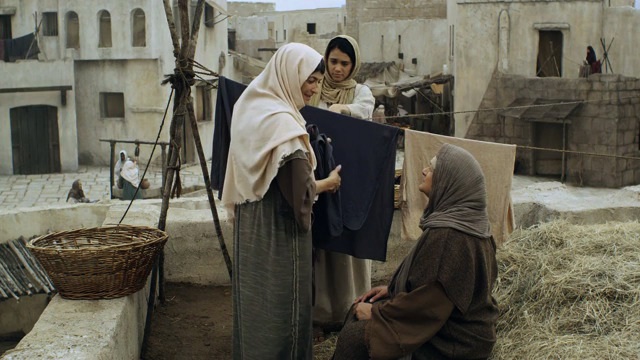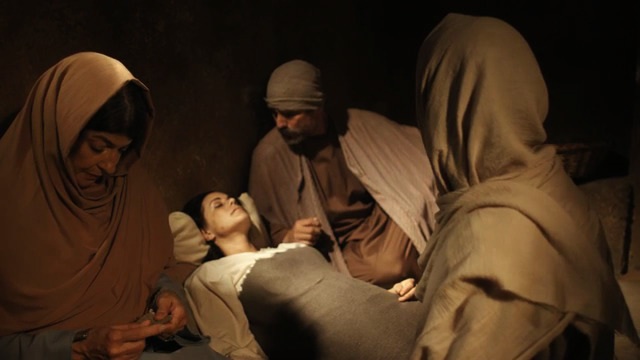
Provided by: JesusFilmMedia.org
Greenlit by Antoy Grant
Lanuage: ENGLISH
Length: 24 mins
Rivka and Laila board up the well of a widow, Amira. But Laila gets very tired and sick. At home, Sara and Mariam snap at each other about their mother. But Laila tells them to stop fighting.
As they help Laila to bed, Sara asks why Laila continues to help Amira. She and her kids keep drinking the bad water from their own well and get sick. They could come and get fresh water from the town. Rivka says they used to. But it was a lot of trouble. Sara insists they’re selfish and might get Laila killed. She thinks they should die before Laila does.
Sara asks Dawud to tell their mother to stop going to Amira’s. But he refuses and says no one listens to him.
Mariam and Rivka go to the roof to hang laundry. Noura joins them and asks about the meaning of the Holy Spirit. Rivka says Jesus promised to always be with them. The Holy Spirit is His presence. Though they can’t see Him, He’s there… like the wind. Noura says she doesn’t feel Him all the time. But Mariam points out that if they felt Him all the time, they wouldn’t really be living by faith. But that He’s always there.
Mariam also thinks of the Spirit like drawing water from a well. She says continuing to drink from a bad well will get you sick. But making the effort to go to the good well, to go to a pure source, will refresh you and give you life. She admits to going to a bad well when she chooses her own way.
Sara and Mariam apologize to each other for getting angry and ask for forgiveness. Noura remembers a story about the Samaritan woman drawing water from a well. Rivka says the living water Jesus spoke of in that story was His Spirit.
When Mariam walks with Rivka back toward Amira’s, they talk about how drawing water from a good well or a bad well is a choice. No matter the circumstances, people can choose whether to follow the Spirit or to follow their own way.
How is the Holy Spirit like the wind?
How is the old nature like a bad well? How is the new nature like a good well?
What can you do to be filled with the Holy Spirit?
Just like we see the effects of the wind, we can see the effects of a Spirit-filled life. As outlined in Galatians, they are: love, joy, peace, patience, kindness, goodness, faithfulness, gentleness,and self-control (Galatians 5:22-23).
There are three kinds of people. The natural person hasn’t decided to follow Jesus. “A natural man does not accept the things of the Spirit of God; for they are foolishness to him, and he cannot understand them, because they are spiritually appraised” (1 Corinthians 2:14). The spiritual person follows Jesus and is directed and empowered by the Holy Spirit. “He who is spiritual appraises all things… We have the mind of Christ” (1 Corinthians 2:15). And the carnal person follows Jesus but chooses his or her own actions in life. “And I brethren, could not speak to you as to spiritual men, but as to carnal men, as to babes in Christ. I gave you milk to drink, not solid food; for you were not yet able to receive it. Indeed, even now you are not yet able, for you are still carnal. For since there is jealousy and strife among you, are you not fleshly, and are you not walking like mere men?” (1 Corinthians 3:1-3).
Like the wells, we choose which nature to go to. We’re able to confess our sin at the moment we’re aware of it and thank God for His forgiveness. Then we can choose to surrender control of our lives to Jesus and rely, by faith, on the Holy Spirit to fill us with His presence and power.
TO WATCH MORE LIFE-CHANGING FILMS GO TO: JesusFilmMedia.org
- Categories:
- Empower
- Shorts-Empower


